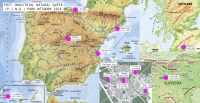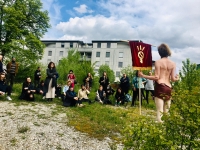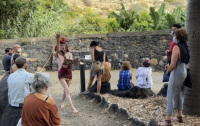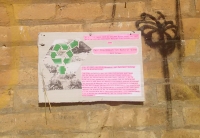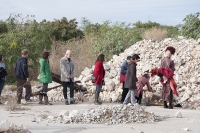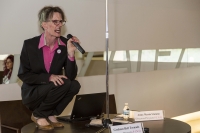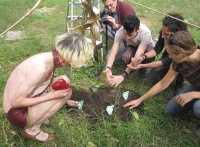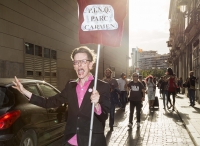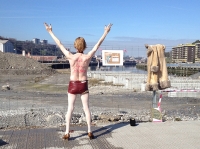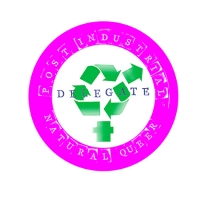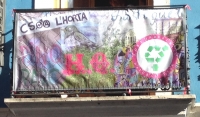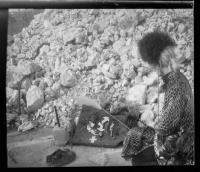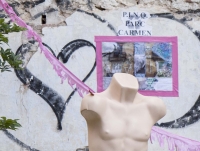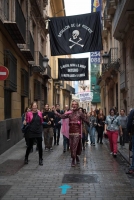P.I.N.Q. Park / Parque P.I.N.Q. / P.I.N.Q. Parc (2013- )


PARKS OPENED TO DATE
BARCELONA, Spain - 22/2/2014 (Davis Museum, by Hangar Arts Centre)
MADRID, Spain – 17/4/2015 (La Neomudejar de Atocha, Museum)
BILBAO, Spain – 26/2/2017 (Zinegoak Film Festival, Zorrozaure)
LA GOMERA, Spain - 16/7/2021 (Encuentros en el Mar Festival, Canary Islands)
LJUBLJANA, Slovenia - 26/4/2024 (Krater, Creative Laboratory)
DUMFRIES, Scotland - 24/8/2024 ( EcoArt, Dumfries Pride)
VALENCIA, Spain
1. CAMPANAR – 21/12/2013 (Open Wounds Cycle, by Bioparc)
2. VELLUTERS – 24/10/2015 (Intramurs Arts Festival)
3. P.I.N.Q. Park H.Q. – 8/4/2016 (Anarco arts festival, CSOA L´Horta allotments)
4. CARMEN – 28/5/2016 (IVAM, Valencian Museum of Modern Art)
5. GRAU – 1/8/2019 (Museari Queer Art Exhibition, Las Naves)
The Post Industrial Natural Queer Park project recognises the symbolic value of abandoned lots, warehouses and factories, spaces which are like open wounds in the landscape, displaying the wreckage of our industrial past in an era when production has been "outsourced" to countries with less strict environmental controls. Europe´s industrial past is slowly being erased by nature´s re-colonization of these spaces. The P.I.N.Q. Park network of nature reserves has been set up to protect "non-spaces" and diversity in all its forms – sexual, biological and cultural.
The conservation movement has often been related to a politics whereby local peoples are displaced to 'clear the land' for hunting, fishing or more recently for ecotourism. To subvert these practises, we designate post industrial spaces as 'safe' for all species that live there (both local and immigrant), for women and LGTBQI people. They are protected – not for the value of their industrial ruins, testimony to the processes of globalisation whereby production has moved to countries that offer an unprotected labour force – but because they harbour ecosystems made up of pioneer species of plants, insects, birds, etc which have adapted to survive under somewhat toxic conditions.
“Welcome to the opening ceremony of this post industrial natural queer park. It is, I believe, the first of its kind - but not before time. We want to claim this territory for all those who have been disinherited from their lands, queers because they don´t fit in at home, women because they´re meant to stay indoors, tribes-people in order that big companies can steal their land, and animals because there's just not enough space anymore. We think all of us need a space to call our own and after a long journey we decided that this was the kind of space that best reflected our situation. It shows the wounds wreaked upon it by industrial society- who knows what was here before but it is just waiting to be redeveloped... today we will plant the seeds that lay our claim to this space.”
GBT, extract from the P.I.N.Q. Park Ceremony opening speech, Campanar (Valencia, 2013).
It´s an on-going project and parks have been opened in a wide variety of spaces including an abandoned space by the Hangar art centre in Barcelona (2014) in collaboration with the Davis Museum, the Neomudejar de Atocha, Madrid (2015) an artspace housed in a formerly disused railway shed and on the former industrial island of Zorrozaurre in Bilbao (2017) in colaboration with the Zinegoak Festival. On the occasion of the First Transnational P.I.N.Q. Con ference held at the Valencian Institute of Modern Art (IVAM), a park was opened in the vacant lot of the museum in Valencia (2016). A park was opened as part of the Museari Queer Art exhibition by Las Naves in Valencia in 2019, our first park outside the peninsula opened in July 2021 in the “Discovery Botanic Gardens” on the idyllic island of La Gomera in the Canaries and in April 2024 we opened our first transnational parks at Krater in Ljubljana (Slovenia) and St Benedict´s Convent in Dumfries (Scotland).
PARQUES ABIERTOS HASTA LA FECHA
BARCELONA - 22/2/2014 (Davis Museum, al lado del centro de arte Hangar)
MADRID - 17/4/2015 (La Neomudejar de Atocha, Museo)
BILBAO – 26/2/2017 (Zinegoak Festival de cine, Zorrozaure)
LA GOMERA - 16/7/2021 (Encuentros en el Mar Festival, Islas Canarias)
LJUBLJANA, Eslovenia - 26/4/2024 (Krater, Laboratorio Creativo)
DUMFRIES, Escocia- 24/8/2024 (EcoArt, Dumfries Pride)
VALENCIA
1. CAMPANAR – 21/12/2013 (Heridas Abiertos ciclo, al lado del Bioparc)
2. VELLUTERS – 24/10/2015 (Intramurs Festival de Arte)
3. P.I.N.Q. Park H.Q. – 8/4/2016 (AnArco Festival de Arte, CSOA L´Horta)
4. CARMEN – 28/5/2016 (IVAM, Instituto Valenciano de Arte Moderno)
5. GRAU – 1/8/2019 (Museari Queer Art Exposición, Las Naves)
El proyecto P.I.N.Q. Park reconoce el valor histérico de los solares, almacenes y fábricas abandonados, espacios que son como heridas abiertas en el paisaje, mostrando los restos de nuestro pasado industrial en una epoca cuando la producción ha sido externalizado a paises con controles medioambientales menos estrictos. Actualmente el pasado industrial de Europa está siendo borrado poco a poco por los procesos de colonización de la naturaleza. La red de reservas naturales P.I.N.Q. ha sido creada para proteger estos espacios y la diversidad en todas sus formas - sexual, biológica y cultural.
A menudo, la conservación de la naturaleza ha sido relacionada con una política conservadora que desplaza a los pueblos indígenas de sus tierras para favorecer la caza, la pesca o incluso las actividades de vacaciones verdes (eco-turismo). Para subvertir estas prácticas, estos lugares post-industriales son designados como espacios “seguros”, tanto para las especies de plantas y animales que viven allí como para las mujeres y las personas LGTBQI. Estos espacios son protegidos, no por el valor de sus ruinas industriales, testimonio de los procesos de globalización por los cuales la producción se ha trasladado a países donde existe una fuerza de trabajo desprotegida, sino porque albergan ecosistemas compuestos por especies pioneras de plantas, insectos, pájaros, etc... que se han adaptado para vivir en estas circunstancias a menudo tóxicas.
“Bienvenides a la ceremonia de inauguración de este parque Post-Industrial Natural Queer. Creo que es el primero de su tipo, pero era necesario. Queremos reclamar este territorio para todes aquelles que han sido desheredades de sus tierras, lxs queers porque no encajan en casa, las mujeres porque están destinadas a permanecer en el interior, los pueblos indigenas para que las grandes empresas puedan robar sus tierras, y los animales porque ya no hay suficiente espacio para ellos. Creemos que todxs necesitamos un espacio para llamarlo nuestro, y después de un largo viaje, decidimos que éste es el espacio que mejor refleja nuestra situación. Demuestra las heridas infligidas por la sociedad industrial, pero está a la espera de ser recalificado...
Hoy vamos a plantar las semillas para reclamar este espacio."
GBT, del discurso de apertura del primer Parque Natural Post-Industrial Queer, Campanar (Valencia, 2013)
Las ceremonias de apertura de los Parques P.I.N.Q. se adaptan al contexto y a menudo incorporan un pasacalle participativo y reivindicativo. El proyecto sigue en curso y parques han sido inaugurados en varios lugares incluyendo el solar adyacente al centro de arte Hangar, Barcelona (2014) en colaboración con el Davis Museum, el espacio de arte Neomudéjar de Atocha, Madrid (2015) y la isla post industrial de Zorrozaurre en Bilbao (2017) en el marco del festival Zinegoak. En ocasión de la Primera Con Ferencia TransNacional P.I.N.Q. , celebrada en el Instituto Valenciano de Arte Moderno, abrimos un parque en el solar vacío del IVAM en Valencia (2016). Abrimos un parque como parte de la exposición Museari Queer Art en Las Naves (Valencia) 2019. nuestro primer parque fuera de la península abrió en julio de 2021 en los “ Jardines del Descubrimiento” en la idílica isla de La Gomera en Canarias. En abril de 2024 abrimos nuestros primeros parques transnacionales en Krater en Ljubljana (Eslovenia) y en el Convento de San Benedicto en Dumfries (Escocia)

